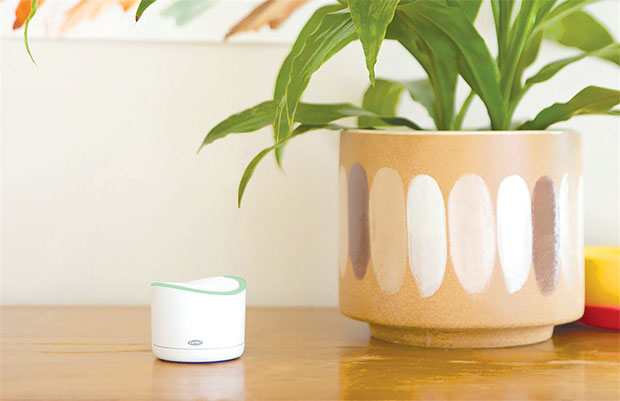Breathe in a happy home: 4 benefits of good indoor air quality
Indoor air quality is an aspect of a healthy lifestyle that is often overlooked.
Even if you lead an active lifestyle and spend a lot of time outdoors, you likely spend more time indoors than you think. According to the U.S. Environmental Protection Agency, Americans spend about 90% of their time indoors. With so much time spent inside, having good air quality is vital.
When you look around your home, you probably don’t see anything unusual. But according to the EPA, your indoor air may have 2-5 times higher levels of airborne pollutants than outdoors.
Healthier air starts with knowing what’s in it. If you want to improve your indoor air quality, consider investing in an indoor quality monitor. For example, you can place a Carrier Air Monitor in different rooms throughout your house and track your home’s air quality from your phone. The monitor detects fine particles (PM2.5), relative humidity, room temperature and total volatile organic compounds (VOCs).
Once you know what is in your air, you and your family can reap the benefits of good indoor air quality. Here are four ways improving indoor air quality can positively impact your life.
DECREASE CHANCE OF MOLD
If you live in a humid or wet climate, you know the struggle of keeping your home mold-free. If you accidentally disturb a patch of mold, it can release spores into the air that you’ll breathe in. To decrease the chance of mold growing in your home, it’s critical you monitor the humidity level indoors. If the humidity in your home is too high, you can manage the moisture by using a dehumidifier or contacting a local heating, ventilation and air conditioning expert.
Make sure to check your bathrooms, kitchen and other areas in your home that have running water where mold is likely to grow. If you have a basement, take a look around for any damp spots where spores can take hold.
MANAGE ALLERGENS AND ASTHMA TRIGGERS
Air quality can significantly impact allergies and asthma. If your indoor air has high concentrations of fine particles, it can exacerbate these respiratory conditions. There are also plenty of allergens that make it into your house, such as pet dander, pollen and smoke.
By identifying and measuring the levels of allergens and pollutants in your air, you can take steps to decrease their presence in your air, reducing the likelihood of triggering allergy and asthma symptoms. For example, you may consider investing in an air purifier. The Carrier Smart Air Purifier captures
99.97% of airborne particles sized 0.3 microns, decreasing the levels of pollutants in standard (up to 430 square feet) and large rooms (up to 560 square feet).
IMPROVE YOUR SLEEP
Do you feel sluggish and tired even after getting a full night’s sleep? The indoor air quality may be the culprit. If particulates in the air trig ger your allergies or asthma, you’ll likely have a hard time falling and staying asleep. According to the American Sleep Association, poor air quality can also increase the severity of existing respiratory illnesses, making it difficult to get quality sleep.
“A good night’s sleep can affect your mood and productivity,” says healthy home expert Holly Rhodes. “If you can identify what is in your air and decrease pollutants and allergens, you’ll be able to breathe easily and deeply throughout the night.”
CHILDREN DO BETTER WITH CLEANER AIR
Studies show that better air quality improves children’s health and academic success. If students have allergies or asthma, poor indoor air quality can set them off, making it difficult for children to concentrate while dealing with respiratory symptoms. Also, just like poor indoor air quality can lead to sluggishness after sleep, children breathing polluted air tend to feel more fatigued.
Knowing how your indoor air quality measures up can help you determine what steps you need to take. You may be surprised about what you’re breathing in. Visit carrierathome.com and take a short quiz to see which products are suitable for your indoor air quality needs.
This article is courtesy of Brandpoint.

